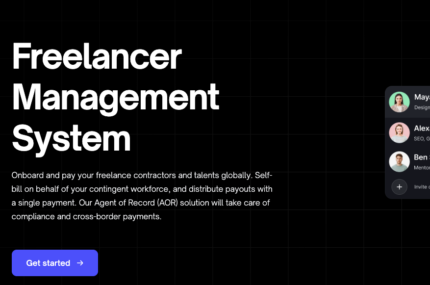What are we gonna talk about:
What is a Merchant of Record?
How the Merchant of Record model works
What is an Agent of Record?
The main difference between MoR and AOR
When you might need one over the other?
How Abillio fits into the picture
Why it matters to get this right
FAQs
You’re growing your business beyond borders, maybe selling your product to customers in multiple countries, or building a team of freelancers scattered across different continents.
You’re excited.. until you realise there’s a whole new layer of complexity you didn’t sign up for: taxes, payment compliance, contracts, chargebacks, local laws you didn’t even know existed.
That’s when you start Googling and suddenly see two terms pop up again and again: Merchant of Record (MoR) and Agent of Record (AOR).
They sound kind of similar, both take work off your plate, but they solve very different problems.
If you sell products or software to customers around the world, the MoR model can save you from building a payments empire from scratch.
If you hire freelancers globally, the AOR model can stop compliance headaches before they start.
Let’s walk through each, in plain English, and figure out which one your business actually needs.
What is a Merchant of Record?
A Merchant of Record is the official seller in a transaction.
When a customer buys from your website, you might think it’s you making the sale. In reality, if you use an MoR, they are the seller from a legal standpoint.
When you use a Merchant of Record, their name, not yours, shows up on your customer’s bank or credit card statement. They’re the ones handling the payment, collecting taxes, and taking the hit if something goes wrong, like a dispute or a refund.
Think of them as your behind-the-scenes commerce partner. You run the shop, they run the checkout, tax counter, and customer payment line.
Example: Paddle is a well-known Merchant of Record for SaaS and digital products. Let’s say you create project management software and start selling it worldwide. Instead of registering for tax in every country, opening foreign bank accounts, and dealing with chargebacks yourself, you sell through Paddle. They collect the payment, send you your share, and handle all the tax, compliance, and refund drama behind the scenes.
Without them, you’d be building an entire finance and compliance department just to keep up.
How the Merchant of Record model works
Here’s exactly what’s happening behind the curtain when you use an MoR:
- Customer pays through your website.
- The MoR processes the payment, calculates the right taxes, and becomes the legal seller in that transaction.
- The MoR sends you the revenue (minus their fee).
From your side, it feels simple. From their side, they’re juggling:
- Different payment processors for different countries
- Ever-changing tax laws and VAT rates
- Fraud checks to stop dodgy transactions
- Chargeback disputes with banks
It’s all the heavy lifting you’d rather avoid.
That’s the role of a Merchant of Record. But selling to customers is only half the story for many businesses. If your challenge is managing a global network of freelancers, you’ll need a different kind of partner.
What is an Agent of Record?
An Agent of Record is about people, not products.
Instead of being the seller, an AOR acts as your legal representative when you engage freelancers or contractors, especially across borders.
Hiring a freelance designer in Argentina? A developer in Poland? A video editor in the Philippines? Your AOR makes sure every hire is done by the book.
They ensure:
- Freelancers are classified correctly (not “accidentally” as employees, which can lead to fines)
- Contracts meet local legal requirements
- Payments arrive in the right currency and on time
- You stay compliant and avoid legal disputes down the line
It’s the safety net between your business and costly mistakes.
The main difference between MoR and AOR
Here’s the simplest way to remember it:
- Merchant of Record = Sells your products to customers and takes on sales liability.
- Agent of Record = Manages your freelancers and takes on compliance liability.
If you think about your business in two directions, outward to customers and inward to your team, MoR handles the outward part, AOR handles the inward part.
| Category | Merchant of Record (MoR) | Agent of Record (AOR) |
| Focus | Products & customers | People & freelancers |
| Role | Official seller in a transaction | Legal representative for hiring freelancers |
| What they handle | Payments, taxes, VAT, fraud checks, chargebacks, compliance for sales | Freelancer classification, contracts, compliant payments, local legal requirements |
| Liability taken | Sales liability (disputes, refunds, tax compliance) | Compliance liability (misclassification, legal disputes) |
| Whose name shows up | MoR’s name appears on the customer’s bank/credit card statement | Not applicable (contracts & compliance handled behind the scenes) |
| Example use case | Selling SaaS worldwide without registering in every country | Hiring freelancers globally while staying compliant |
| Example providers | Paddle | Abillio |
| When you need it | You sell to customers in multiple countries and want one partner to manage payments & compliance | You hire freelancers in multiple countries and want compliant contracts, payments, and reduced legal/tax risk |
| Shortcut to trust | Customers trust you more when payments & taxes are handled securely | Freelancers trust you more when they’re paid fairly, on time, and under legal protection |
When you might need one over the other?
You might need a Merchant of Record if:
- You sell to customers in multiple countries
- You don’t want to register for tax in every location
- You want one partner to handle payments, taxes, and compliance for sales
You might need an Agent of Record if:
- You hire freelancers in multiple countries
- You want compliant contracts and payment processes
- You want to reduce legal and tax risk while scaling your team
Some companies need both, a SaaS company might use Paddle as their MoR for their product sales and Abillio as their AOR to manage a global team of contractors.
How Abillio fits into the picture
At Abillio, we’re all about the Agent of Record side.
We help you:
- Onboard freelancers anywhere in the world
- Create legally valid contracts for every country you operate in
- Pay in multiple currencies, without unnecessary fees or delays
- Reduce your risk of misclassification and compliance mistakes
That means no hunting for local lawyers in five countries, no guessing if your contract covers the right clauses, and no spreadsheets tracking who’s been paid when.
We take that complexity off your plate so you can focus on building, selling, and scaling.
Why it matters to get this right
Misclassifying a freelancer can mean back taxes, penalties, or even lawsuits. For example, in 2023, Uber agreed to pay an $8.4 million settlement to California drivers who claimed they were misclassified as independent contractors rather than employees.
Mishandling global sales tax can lead to frozen accounts or hefty fines.
The truth is, compliance isn’t just about avoiding trouble, it’s also about building trust. Customers trust you more when their payments are secure and taxes are handled correctly. Freelancers trust you more when they’re paid fairly, on time, and under contracts that protect them. And an MoR or AOR is your shortcut to that trust.
FAQs
1. Can I be my own Merchant of Record?
Technically yes, but you’d have to manage tax registration, merchant accounts, and compliance in every market you sell to. It’s costly and time-consuming.
2. Can a company be both an MoR and an AOR?
Some large companies build both functions in-house, but most businesses choose a specialist for each.
3. Do I need Merchant of Record?
If you sell internationally and want someone else to handle taxes, compliance, payments, and chargebacks, then yes a Merchant of Record is a good fit.


